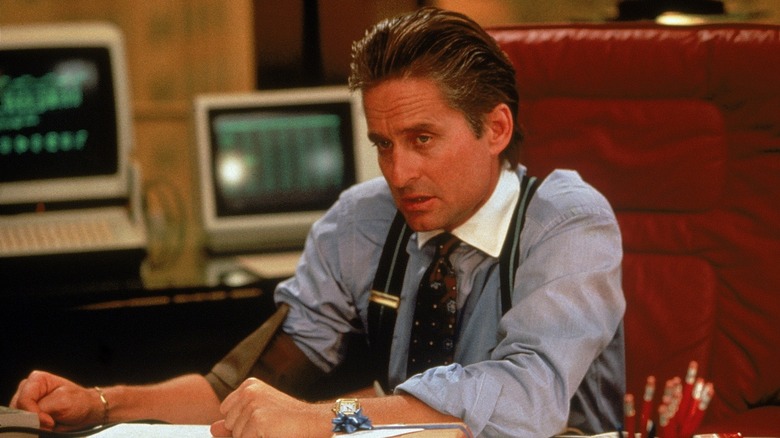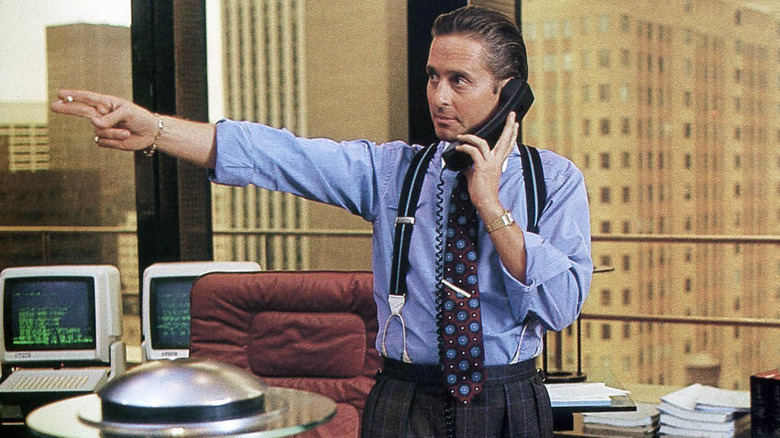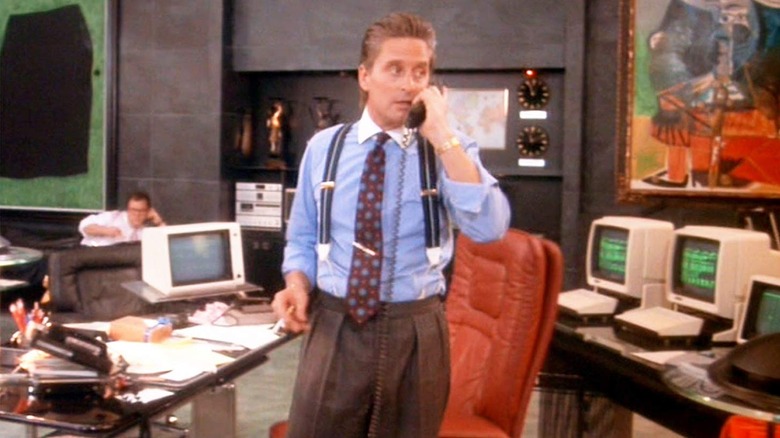Why Michael Douglas Feels Bittersweet About Gordon Gekko's Impact In Wall Street
The 1980s was a time of excess. Neon color schemes splashed storefronts in malls across the country. You weren't cool unless you had the latest gadget, car, or fashion. Some might say it was driven by greed. And "greed, for lack of a better word, is good." At least that what Gordon Gekko of "Wall Street" would have you believe.
The decade was marked by style over substance and quantity over quality. Much of the driving force was popular culture. MTV put a face to music, making image almost as important as the music. The toy industry was transformed by movie merchandising deals and cartoons that were created solely to sell toys. And the VHS brought movies into our homes, leading to the rise of the magical places known as video stores.
Big business got bigger in the 1980s under President Ronald Reagan and his "Reaganomics" economic plan that deregulated the finance sector. It became open season for shady deals on Wall Street. In 1987, Oliver Stone captured the essence of 1980s excess with the film "Wall Street." The movie also created one of Michael Douglas' most infamous characters, financial tycoon Gordon Gekko.
As it turns out, not all the ideals of the '80s died out with the decade. For many, Gekko became an antihero and undying symbol of power. Despite all the character's misgivings, some continued to live by his "greed is good" mantra. So, after all these years, does Douglas believe what his character espoused about the decade of decadence and greed?
How Wall Street captured the '80s
"Wall Street" stars Michael Douglas as Gordon Gekko and Charlie Sheen as Bud Fox, Gekko's naïve young apprentice. As the son of a union leader, Fox's morals are challenged at every turn as the temptations of easy money prove too much for him. Gekko is more than willing to teach Fox every underhanded trick in the book to milk investors for every penny, typically by purchasing and liquidating entire companies.
Set in New York City, the film brilliantly captures the era of extravagance, though a few scenes particularly stand out. When Fox starts making big money, he purchases an Upper East Side penthouse and turns it into an '80s yuppie sanctuary, to the tune of the Talking Heads' quintessential '80s tune "This Must Be the Place."
Another scene features a powerful monologue about Reagan's failed trickle-down economics policies that offers some insight into the mind of Gordon Gekko. After Fox gives Gekko a tip about the airline his father works for, Gekko pushes Fox for more insider trading. Although it's a poignant moment that offers the only sympathetic moment of the film for the self-made millionaire, Gekko quickly uses that vulnerability to persuade Fox to do his bidding.
"You work hard? I bet you stayed up all night analyzing that dog s*** stock you gave me, where'd it get you? My father, he worked like an elephant pushing electrical supplies until he dropped dead at 49 with a heart attack and tax bills. Wake up, will you pal? If you're not inside, you are outside, okay? And I'm not talking about some $400,000-a-year working Wall Street stiff flying first class and being comfortable, I'm talking about liquid, rich enough to have your own jet. Rich enough not to waste time. Fifty, one hundred million dollars buddy. A player, or nothing."
Although Gordon Gekko is one of the most iconic villains of '80s cinema, Douglas says he's torn on the character's legacy.
Douglas must remind fans he was the villain
In reflecting on the Gordon Gekko character with WBUR, Michael Douglas said he's proud of the film because it "captured the zeitgeist of that moment." He calls the role his most recognizable, which speaks to its impact given Douglas' extensive filmography. Despite the significance of the role, Douglas also explained that being Gordon Gekko is challenging because he still gets approached by fans celebrating the character. Douglas said:
"People love Gordon Gekko. You know, if I get one more drunken Wall Street guy coming up, 'You're the man, you know, you're the man.' And I said, 'Hey, I was the villain. Remember? I went to jail.'"
The reality is Gekko remains a hero in plenty of corners of Wall Street to this day. Economic historian Steven Fraser told Reuters:
"There is a sexiness attached to characters like that in the 1980s. Power tripping was part of the scene: that rip-their-eyes-out brutality ... People thought the greed decade was over, but it never really ended, and it came back tenfold. People said about the movie, 'Oh, it's outdated.' Then came Bernie Madoff and the thousands of others like him."
Douglas reprised the role in the 2010 sequel "Wall Street: Money Never Sleeps." The film takes place as the 2008 global financial crisis unfolds. In the film, Oliver Stone backtracks on the phrase that made Gekko a Wall Street deity when Gekko says, "Someone reminded me the other evening I once said greed is good. Now it seems it's legal because everybody is drinking the same Kool-Aid."
It seems audiences continue to drink the Kool-Aid, too. From Gordon Gekko to Jordan Belfort (celebrated in Scorsese's "The Wolf of Wall Street"), it seems we just can't resist the draw of these handsome, power-hungry protagonists that monopolize our movies about America's financial catastrophes.


